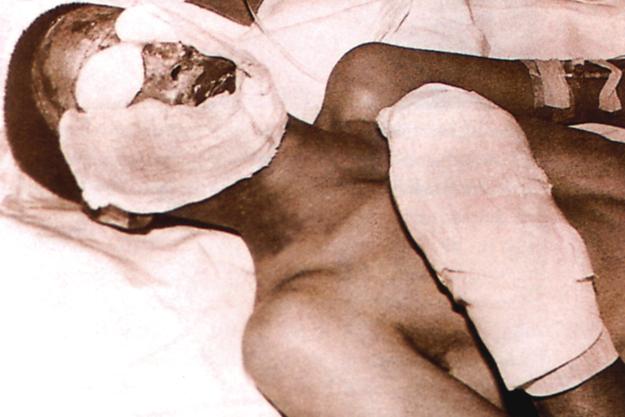
Iranian victim receiving medical treatment for exposure to chemical weapons.
By: Mr Claus-Peter Polster, Health and Safety Branch, OPCW
On 9 November 2008, the Ninth Course on Medical Defence against Chemical Weapons concluded successfully. Twenty-two medical doctors from 21 Member States of the OPCW participated. They had the unique opportunity to take part in a training course during which they listened to lectures on the basics of defence against chemical weapons; they were also able to conduct medical examinations of patients who had actually been exposed to nerve and blister agents during the Iraq-Iran war, which took place in the 1980s.
Since 1998, this course has been conducted at the International Medical Centre for Training and Treatment-Chemical Weapons (IMCTT-CW) in Tehran, the Islamic Republic of Iran, and has been generously supported by the National Authority of that State Party. The participants were able to speak with Iranian doctors who had treated chemical casualties in the battlefield and who had often risked their own lives to do so. These doctors are still providing medical care for these survivors.
During the Iran-Iraq war, which raged from 1980 until 1988, the Islamic Republic of Iran was repeatedly subjected to attacks with nerve agents and mustard gas. These indiscriminate attacks caused more than 100,000 casualties, both military and civilian, 20,000 of whom, it is estimated, died immediately or in the following days and months after experiencing prolonged and terrible suffering. 34,000 survivors are, according to the Veterans Foundation Janbazan, still suffering from the long-term effects of exposure to chemical-warfare agents.
To prevent the re-occurrence of such suffering, Iranian doctors and their patients are dedicated to sharing their experience with medical specialists from all over the world. The four-day course included lectures about the following: chemical weapons, the OPCW, how to recognise that a chemical attack has taken place and the means of detection, protective equipment, and decontamination. This introduction provided the participants with an understanding on how to protect themselves if they were ever exposed to such an attack.
These lectures were given by specialists from the OPCW Technical Secretariat’s Health and Safety Branch. Experts from the OPCW Assistance and Protection Branch provided information about the efforts of the OPCW to assist Member States, should they ever be threatened or actually attacked with chemical weapons. Iranian doctors shared their vast experience and expertise in relation to the acute and chronic effects of chemical weapons on the eyes, the skin, and the lungs.
A well-known expert from the German Armed Forces Institute for Toxicology in Munich, Dr Kai Kehe, held lectures about the current status and the latest research on the pathology of nerve and blister-agent poisonings. In one segment of this course, the participants had the opportunity to interview the victims of chemical-warfare agents, and thus were able to gain the skills and knowledge that will prove useful, should they ever be involved in an investigation of alleged use.
The interview session was a sobering experience for the participants, in that they interacted with individuals who, for more than 20 years, have suffered from the chronic effects of being exposed to chemical weapons and who are determined that no one should ever suffer again from the effects of these horrific weapons.
The course also focused on clinical aspects in relation to the impact of chemical weapons on the human body. Participants, under the supervision and assistance of Iranian specialists, carried out medical examinations on the individuals who had become casualties of the chemical weapons that had been used during the Iran-Iraq war.
The course concluded with closing speeches by the Head of the National Authority of Iran, Dr Gholamhossein Deghani, and Mrs Kalimi M. Mworia, Director of the OPCW International Cooperation and Assistance Division, both of whom reiterated the importance of this course.
The OPCW would like to express its appreciation to IMCTT-CW in the Islamic Republic of Iran for providing information and training to the attendees on how to deal with the medical challenges in the event chemical weapons are ever used.
